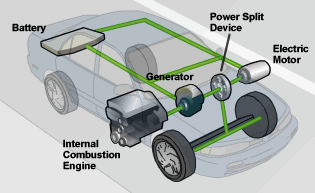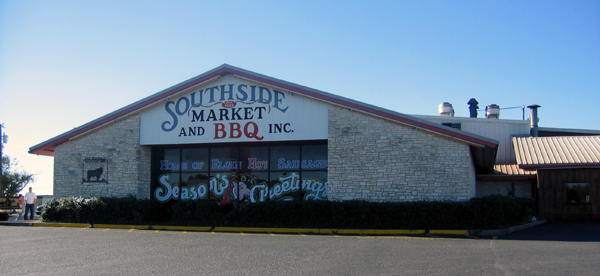Since selling my car to fund an excursion in Southeast Asia two years ago, I've been a public transportation denizen in California and Austin. I'd intended to have a car by now, but several things have stopped me (in no particular order):
- First, the expense. One month's worth of commuting can cost you either a $10 bus pass or $600 in car payments, fuel costs, maintenance and car insurance. I like having that extra $590 in my pocket every month, particularly as I gear up for home ownership.
- Second, the productivity. I read more now as a rider than I ever did as a driver. And if I need to bust out the laptop, sure it's a little awkward, but it's not impossible.
- Third, the traffic and its attendant aggravation. I remember riding the train out to Intel's campus, whizzing past all those cars that were practically parked on I-80 during rush hour and thanking God I wasn't one of those saps about to blow a vein in his forehead.
- Fourth, safety. There are no Type A riders. There are millions of Type A drivers. Again on I-80, I've seen several such drivers (or their victims) carted off in body bags.
- Fifth, the environment. Nitpick all you want about the mounting evidence of global warming. But you're not going to point to those millions of cars on the freeways chugging fossil fuel from Global Jihad's ground zero and flooding the air with carbon monoxide and then tell me that nothing bad is happening there.
Still, I get a little burned out on public transportation. It's public. Meaning, you have to share it with obese people, smelly people, crazy people and lots of people. You sacrifice some autonomy, in that you go when and where the bus goes, as opposed to precisely whenever and wherever you feel like going.
But the egalitarian element of riding has its rewards as well, because you do get to see those snatches of people's humanity against which, for the most part, we desperately try to insulate ourselves. Today was a perfect example. A homeless-looking fellow got on the bus and, while I can't verify that he stunk, I wouldn't be surprised by it. He was missing his left arm below the elbow and the scars are there for the entire world to see. He had docile eyes, the eyes of someone who's been tossed around long enough by life's vicissitudes that he wasn't about to put up a fight about anything now. He was just trying to get where he's going.
As I said, I couldn't attest to his odor. But a middle-aged man sitting across the aisle from him certainly could. And did. First, it started off moderately:
"Whew! You need a bath, brother!"
The homeless man, wearing a New Orleans Saints cap, stared ahead, vaguely apologetic, but mostly vacant. About a minute later:
"Look, if you want to be in Austin, fine," the offended man said, possibly interpreting the Saints cap as a sign that this man was a Katrina refugee. "But you stink. You owe it to yourself and everyone here to take a bath. You ride this line every day. If you don't take a bath, we're going to get the authorities to keep you from getting on the bus."
It should be noted that the bus was completely full of riders and equally full of awkward silence. Like the homeless man, we're all just trying to get where we're going without any conflicts. But some opinions likely were beginning to form. At this point, a superficial reading of the situation would have been that, of the two, the offended man, while hostile, was still in no danger of being presumed a social miscreant … yet. The homeless guy – well, he was homeless, right? Sitting there in silence, he could be just waiting to go off. Tick, tick, tick …
Yet, like so many of us, the offended man couldn't leave well enough alone and began to squander the last of his goodwill. He'd tilt his head away from the offender, cover his face and let out a deliberately audible "whew!" Then, becoming increasingly obsessed, he'd look back at the blankly staring rider, curve his mouth to form another insult, briefly suspend the next round of hostilities, and then come out with it anyway, as though he had no choice:
"You need to get a job," he said. "You smell awful. We're going to put you to work."
Perhaps in response, a female commuter in her 30s – white, professional – got up, stood between the two men and grabbed the ceiling rails as though bracing to get off at the next stop. But she never got off while I was on the bus.
Undeterred, the vocal man craned around behind the commuter to say something, caught himself and then muttered something inaudible. It was something about dying and the drag queen seated to the quiet man cocked his eyebrow, looked at me and smirked. Sitting there like Gandhi, the homeless man gave no evidence of having heard anything. At this point, a black woman missing her top front teeth and her preschool-aged son or grandson got on the bus and the vocal man got up to offer his seat. The mother thanked him and sat down with her son and the man backed up several feet.
That should've been the end of it, but by then the bullying became compulsive. He muttered one insult I couldn't make out and then this:
"Hey man, you're gonna die."
And that was it. Instantly, collective awkwardness gave way to collective outrage. The mother lit into him first:
"Nobody needs to be talking to anybody that way," she said matter-of-factly while rifling through her pocket book. "That ain't right."
The drag queen was next:
"Just because he's different doesn't give you the right to talk to him that way. He's better off than you, anyway."
"Shut up, you faggot," the angry man said.
A woman standing in the front of the bus chimed in:
"You don't talk to people that way," she said. "I've got family members who are different from me, but I still have to love them."
"That ain't no way to treat another human being," the mother added.
"Ma'am, I respect you," the now attacked man said. "I love you."
"You don't know me!" she shot back, prompting laughter from the queen.
"Shut up, faggot!"
"You don't know me, either," the queen replied, laughing.
And so on. All the while, the homeless man kept his blank expression, occasionally lolling his eyes toward the sources of the attacks that rained down on his accuser. If his non-aggression was a deliberate tactic – something out of MLK Jr.'s and Gandhi's playbook – he'd executed it brilliantly. It was a singular moment in public transportation history: a bus full of commuters had been motivated to do something besides avoid eye contact. And yet, by doing and saying absolutely nothing, the homeless man had the mob right where he needed them. Whatever goodwill his accuser had squandered had flowed to him, and then some.
Of course, he gave no evidence of anything premeditated or even of being aware of the situation. The tar baby, he don't say nothin'.
At this point, we arrived at my stop, although, for once, I would have liked to have ridden further. Getting up, I smiled at the queen.
"Never a dull moment on the bus," I said. He nodded, grinning.
























